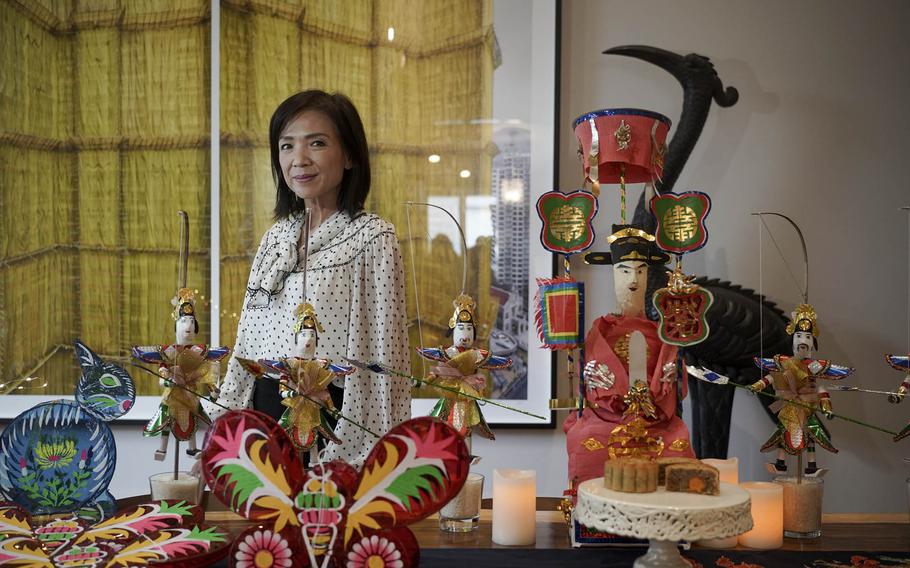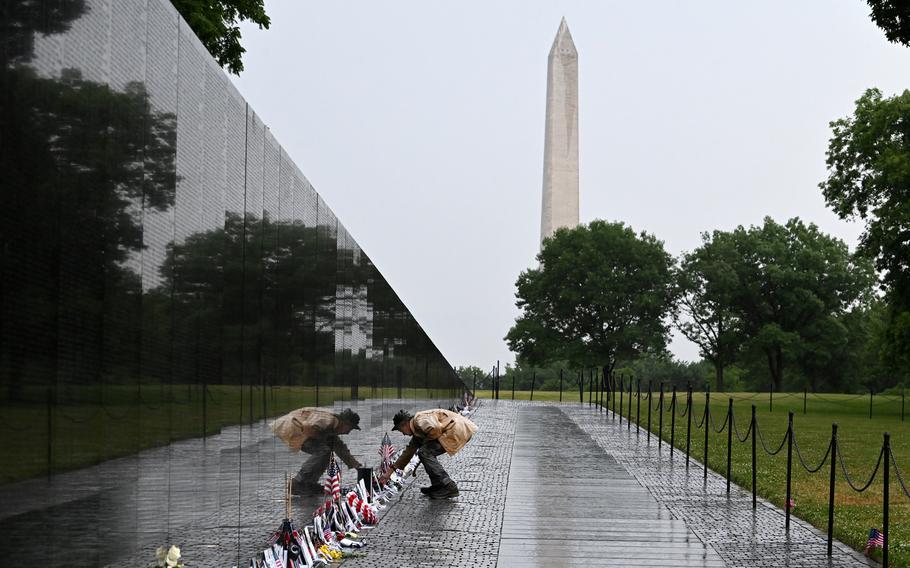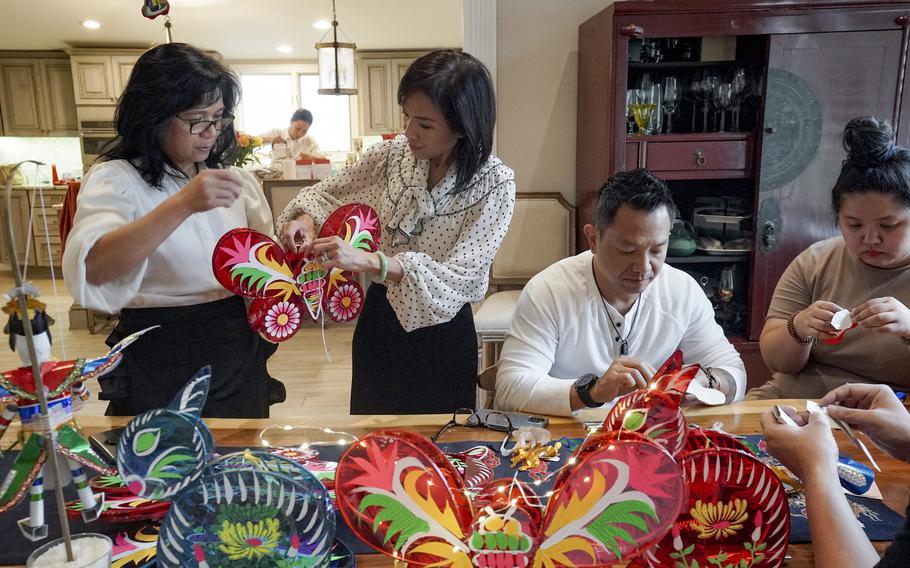
Erin Phuong Steinhauer, co-founder of the Vietnam Society, is surrounded by handmade goods Sept. 26, 2023, in Falls Church, Va., that will be part of Vietnam Week, a celebration of Vietnamese food, film, art and literature. (Bonnie Jo Mount/The Washington Post)
Eventually, Vietnamese Americans hope autumn in D.C. will mean pumpkins, leaves and Vietnam.
“Like in the spring, people think of Japan in this very pink, cherry blossom, Zen way,” said Erin Phuong Steinhauer, whose goal is to weave the Vietnamese mid-autumn moon festival into American popular culture.
It starts Friday, when the last supermoon of the year will rise and Vietnamese children will fill the streets parading with colorful paper lanterns, some in the shapes of carp and stars. There will be dancing, music and mooncakes.
“It’s one of the biggest celebrations, one of the most beautiful times in Vietnam,” Steinhauer said. But it’s unfamiliar across America.
Right now?
When most Americans think of Vietnam, “one of the first things that comes up is the war,” said Kevin Tien, a buzzy chef bringing high-concept Vietnamese cuisine to the local foodie circuit.
And that’s especially true in D.C., the epicenter of the decisions, controversies, passions and protests about the war that the United States entered more than 50 years ago.
Don’t believe it?
Take a look at the conversations over the past two years led by the U.S. Institute of Peace. It asked a group of Vietnamese university students what comes to mind when they think of America and then reversed the exercise to ask American students for their first thoughts on Vietnam.
“Every single one of the American students said ‘war,’” said Andrew Wells-Dang, a senior expert on Southeast Asia with the institute. The Vietnamese students talked about American movies, music and culture.
“They’ve moved past the war,” Wells-Dang said. “The war for them is history. It’s what happened in their grandparents’ generation.”

A man makes a Memorial Day visit to the Vietnam Veterans Memorial, on May 29, 2023. (Matt McClain/The Washington Post)
Diplomatically, the United States just made a big move toward normalization with President Biden’s September trip to Vietnam and announcement that the countries would bolster relations, countering China’s growing influence.
“For decades, it would have been unthinkable for an American president to stand in Hanoi alongside a Vietnamese leader and announce a mutual commitment to the highest level of countries’ partnership,” Biden said at the U.N. General Assembly last week.
“But it’s a powerful reminder that our history need not dictate our future,” Biden said.
Tien and Steinhauer are the Vietnamese Americans doing that on the ground - trying to change the lens through which Vietnam is viewed in this region and eventually across the nation, to change the conversation from war to culture.
An acclaimed chef, Tien is doing it with the food at his popular Vietnamese restaurant, Moon Rabbit.
Pandan-scented rice. Vietnamese coffee. The way his grandmother braised fish in a clay pot. That’s what he wants America to think of when it comes to his ancestral homeland.
Steinhauer has her list of images she wants America to move past.
“The conical hats. Rice paddies. War-torn,” said Steinhauer, who was a 9-year-old war refugee when she came to America. “Vietnam is so much more than that.”
They were children growing up in an America that defined their ancestral homeland with war movies like “The Deer Hunter” and “Born on the Fourth of July.”
For folks like Tien and Steinhauer, the key to survival in postwar America was assimilation. Hau became Kevin. Phuong became Erin. And they worked, largely isolated from the vibrant communities where Vietnamese Americans congregated in California and Texas to excel in their fields. To be smart, successful, and American. And to be not Vietnamese.
They’re done with that.
“As I’m older now, I’ve been trying to learn more about my culture and my heritage,” Tien said. “Being the first person in my family born here, I was pushed to assimilate and blend in. And in the process of growing up, I lost touch with a lot of aspects of Vietnamese culture. And there are so many other people just like me.”
Steinhauer chucked a demanding and lucrative corporate life to co-found the Vietnam Society with her husband, who is a renowned photographer specializing in Vietnam. And she’s pouring her energy into this week of festivals, food and events in D.C. to further her mission of redefining her homeland’s place in American culture.

Erin Phuong Steinhauer, second from left, at her home in Falls Church, Va., on Sept. 26, 2023, with her sister, Thu Pham, from left, her brother, Cuong Pham, and Quan Lam, as they prepare to celebrate Vietnam Week. (Bonnie Jo Mount/The Washington Post)
It’s familiar territory for America’s immigrants - what to bring from the old world and how to make it part of the American fabric. For Vietnamese Americans, the war delayed that process.
The first refugees of the war landed in the D.C. region after Saigon fell in 1975 - largely an intellectual class escaping persecution. They created a vibrant enclave in Clarendon that was called “Little Saigon.” When a Metro station arrived and real estate prices went up, the hub relocated to Falls Church, which is now home to Eden Center, the largest Vietnamese American strip mall on the East Coast.
It’s an anchor for the region’s Vietnamese community and a popular destination for non-Vietnamese Americans to indulge in pho and Vietnamese coffee. The center’s shop owners defiantly fly the old, South Vietnamese flag. Steinhauer’s campaign wants to move away from the recent past (the war) and instead bridge this new generation of Vietnamese Americans to an ancient past - to the legends of moons and farmers, the beauty of the land, the traditions of ceremonies.
Vietnam Week, in its second year, begins with a gala honoring Vietnamese Americans who are already doing this. (I get to introduce Chef Tien at the event!) They will also hold film screenings, book discussions and expert panels. There’s an author whose gorgeous graphic novel, “The Magic Fish,” weaves ancient Vietnamese fairy tales with his own coming out story. Half of Capitol Hill’s Eastern Market will be dedicated to Vietnamese food and exhibits on Sunday.
Steinhauer marvels at the enduring impact of the more than 3,000 cherry trees gifted to D.C. by Japan in 1912, whose annual celebration helped ease postwar tensions.
“Sakura. Zen. Anime. They close down blocks of D.C. near the Capitol every spring, and the festival is packed,” she said.
And the District is better for it, Steinhauer knows. We can’t appreciate what we don’t see.
“When we see Asia in this country, we only see China, Japan, India and Korea. Those are really great cultures, but Vietnam is just as great.”